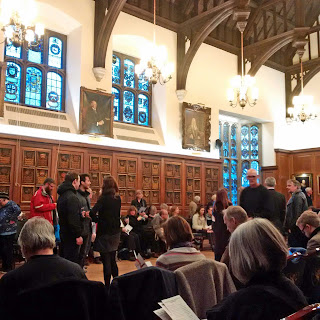 |
| The interval |
The simplest way to unleash these is to have a script-in-hand, wear-your-own-clothes, move-dynamically-around-the-space-not-bumping-into-each-other reading. Once a year Read Not Dead serves an intriguing cocktail of legal amateur thesps versus real ones in Gray's Inn Hall. This year it was The Little French Lawyer by John Fletcher and Philip Massinger, a polemic against the vice of duelling, directed (briefly) by Nick Hutchison.
 |
| John Fletcher |
'...I am no Italian
To lock her up; nor would I be a Dutchman,
To have my Wife, my soveraign, to command me...'
It is also very #MeToo, with threats of rape and murder lightly dismissed in a 'happy' ending, and a jolly plot device which allows a strange man to invade the bed of a 16-year-old virgin but that's fine, she's cool with it of course.
 |
| Philip Massinger |
The attraction of these fleet-footed performances - which have a fiercely loyal following - is that they highlight the actors' skill, vulnerability and risk-taking, without the distractions (which can be ponderous) of costume, lighting, sets, music, make-up, props and, most importantly, the inescapable clamp of the director's world view which may or may not be to your liking.
It was not hard to distinguish the actors from the lawyers. Barristers focus on a small audience: the bench and, if present, the jury. Emotion is cauterised by court procedure. They deliver from one spot. Insults exchanged between bench and counsel are normally so subtle as to be imperceptible to the lay person. Melodrama is rare. William Clegg QC may have fallen from his chair in the 'phone hacking trial but that was not grandstanding to the jury. In court, containment has more effect than histrionics - as in the calm, measured presentation of harrowing facts in In the matter of an application by the Northern Ireland Human Rights Commission for Judicial Review about abortion, heard in the UK Supreme Court last year.
The Globe actors provided the superstructure. Philip Bird kept the play together and gave some charm to the psychopathic anti-hero Dinant. Eliza Butterworth was zestful and winning as the heroine, Lamira. William Foote, Emily Houghton, Rosalind Lailey, Charlotte Newton-John, Patrick Osborne, Doug Rao and Jay Varsani made it look easy when it wasn't.
For Gray's Inn, the distinguished Sir Michael Burton, who in addition to his many legal achievements is a grandfather of nine, was dashing and appealing as the loyal Lamira's one-armed, one-legged husband in the May-and-December romance at the centre of the play. This will not resonate with many still living, but something in the timbre of his voice took me back to Toytown on Children's Hour (broadcast on the Home Service) and the character of Mr Growser ('This is disgrrrrrrrraceful - it ought not to be allowed'). Enthusiastic forensic support was provided by Master Roger Eastman, Gillian Geddes, Colin Manning, Josie Teale, and Sandra Villani (of Venters Solicitors).
Presiding over all was a portrait of Lord Atkin, immortalised by Donoghue v Stevenson, a case as dramatic and yet inconclusive (was there a snail in the ginger beer?) as this Jacobean comedy.